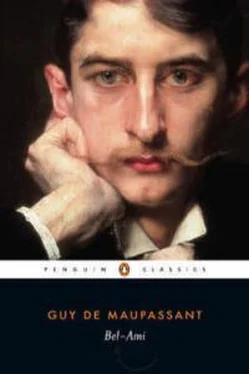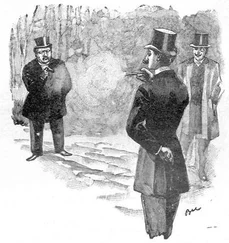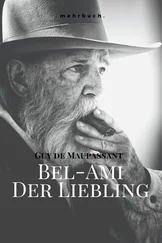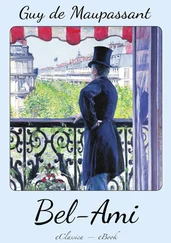"Yes—in the summer–time."
"Very well."
His mother grumbled: "I hope you will not regret what you have done."
Georges gave them two hundred francs to appease them, and the cab arriving at ten o'clock, the couple kissed the old peasants and set out.
As they were descending the side of the hill, Duroy laughed. "You see," said he, "I warned you. I should, however, not have presented you to M. and Mme. du Roy de Cantel, senior."
She laughed too and replied: "I am charmed now! They are nice people whom I am beginning to like very much. I shall send them confections from Paris." Then she murmured: "Du Roy de Cantel. We will say that we spent a week at your parents' estate," and drawing near him, she kissed him saying:
"Good morning, Georges."
He replied: "Good morning, Madeleine," as he slipped his arm around her waist.
The Du Roys had been in Paris two days and the journalist had resumed work; he had given up his own especial province to assume that of Forestier, and to devote himself entirely to politics. On this particular evening he turned his steps toward home with a light heart. As he passed a florist's on Rue Notre Dame de Lorette he bought a bouquet of half–open roses for Madeleine. Having forgotten his key, on arriving at his door, he rang and the servant answered his summons.
Georges asked: "Is Madame at home?"
"Yes, sir."
In the dining–room he paused in astonishment to see covers laid for three: the door of the salon being ajar, he saw Madeleine arranging in a vase on the mantelpiece a bunch of roses similar to his.
He entered the room and asked: "Have you invited anyone to dinner?"
She replied without turning her head and continuing the arrangement of her flowers: "Yes and no: it is my old friend, Count de Vaudrec, who is in the habit of dining here every Monday and who will come now as he always has."
Georges murmured: "Very well."
He stopped behind her, the bouquet in his hand, the desire strong within him to conceal it—to throw it away. However, he said:
"Here, I have brought you some roses!"
She turned to him with a smile and said: "Ah, how thoughtful of you!" and she kissed him with such evident affection that he felt consoled.
She took the flowers, inhaled their perfume, and put them in an empty vase. Then she said as she noted the effect: "Now I am satisfied; my mantelpiece looks pretty," adding with an air of conviction:
"Vaudrec is charming; you will become intimate with him at once,"
A ring announced the Count. He entered as if he were at home. After gallantly kissing Mme. Du Roy's hand, he turned to her husband and cordially offered his hand, saying: "How are you, my dear Du Roy?"
He had no longer that haughty air, but was very affable. One would have thought in the course of five minutes, that the two men had known one another for ten years. Madeleine, whose face was radiant, said: "I will leave you together. I have work to superintend in the kitchen." The dinner was excellent and the Count remained very late. When he was gone, Madeleine said to her husband: "Is he not nice? He improves, too, on acquaintance. He is a good, true, faithful friend. Ah, without him—"
She did not complete her sentence and Georges replied: "Yes, he is very pleasant, I think we shall understand each other well."
"You do not know," she said, "that we have work to do to–night before retiring. I did not have time to tell you before dinner, for Vaudrec came. Laroche–Mathieu brought me important news of Morocco. We must make a fine article of that. Let us set to work at once. Come, take the lamp."
He carried the lamp and they entered the study. Madeleine leaned, against the mantelpiece, and having lighted a cigarette, told him the news and gave him her plan of the article. He listened attentively, making notes as she spoke, and when she had finished he raised objections, took up the question and, in his turn, developed another plan. His wife ceased smoking, for her interest was aroused in following Georges's line of thought. From time to time she murmured: "Yes, yes; very good—excellent—very forcible—" And when he had finished speaking, she said: "Now let us write."
It was always difficult for him to make a beginning and she would lean over his shoulder and whisper the phrases in his ear, then he would add a few lines; when their article was completed, Georges re–read it. Both he and Madeleine pronounced it admirable and kissed one another with passionate admiration.
The article appeared with the signature of "G. du Roy de Cantel," and made a great sensation. M. Walter congratulated the author, who soon became celebrated in political circles. His wife, too, surprised him by the ingenuousness of her mind, the cleverness of her wit, and the number of her acquaintances. At almost any time upon returning home he found in his salon a senator, a deputy, a magistrate, or a general, who treated Madeleine with grave familiarity.
Deputy Laroche–Mathieu, who dined at Rue Fontaine every Tuesday, was one of the largest stockholders of M. Walter's paper and the latter's colleague and associate in many business transactions. Du Roy hoped, later on, that some of the benefits promised by him to Forestier might fall to his share. They would be given to Madeleine's new husband—that was all—nothing was changed; even his associates sometimes called him Forestier, and it made Du Roy furious at the dead. He grew to hate the very name; it was to him almost an insult. Even at home the obsession continued; the entire house reminded him of Charles.
One evening Du Roy, who liked sweetmeats, asked:
"Why do we never have sweets?"
His wife replied pleasantly: "I never think of it, because Charles disliked them."
He interrupted her with an impatient gesture: "Do you know I am getting tired of Charles? It is Charles here, Charles there, Charles liked this, Charles liked that. Since Charles is dead, let him rest in peace."
Madeleine ascribed her husband's burst of ill humor to puerile jealousy, but she was flattered and did not reply. On retiring, haunted by the same thought, he asked:
"Did Charles wear a cotton nightcap to keep the draft out of his ears?"
She replied pleasantly: "No, a lace one!"
Georges shrugged his shoulders and said scornfully: "What a bird!"
From that time Georges never called Charles anything but "poor Charles," with an accent of infinite pity. One evening as Du Roy was smoking a cigarette at his window, toward the end of June, the heat awoke in him a desire for fresh air. He asked:
"My little Made, would you like to go as far as the Bois?"
"Yes, certainly."
They took an open carriage and drove to the Avenue du Bois de Boulogne. It was a sultry evening; a host of cabs lined the drive, one behind another. When the carriage containing Georges and Madeleine reached the turning which led to the fortifications, they kissed one another and Madeleine stammered in confusion: "We are as childish as we were at Rouen."
The road they followed was not so much frequented, a gentle breeze rustled the leaves of the trees, the sky was studded with brilliant stars and Georges murmured, as he pressed his wife to his breast: "Oh, my little Made."
She said to him: "Do you remember how gloomy the forest at Canteleu was? It seemed to me that it was full of horrible beasts and that it was interminable, while here it is charming. One can feel the caressing breezes, and I know that Sevres is on the other side."
He replied: "In our forests there are nothing but stags, foxes, roebucks, and boars, with here and there a forester's house." He paused for a moment and then asked: "Did you come here in the evening with Charles occasionally?"
She replied: "Frequently."
Читать дальше











